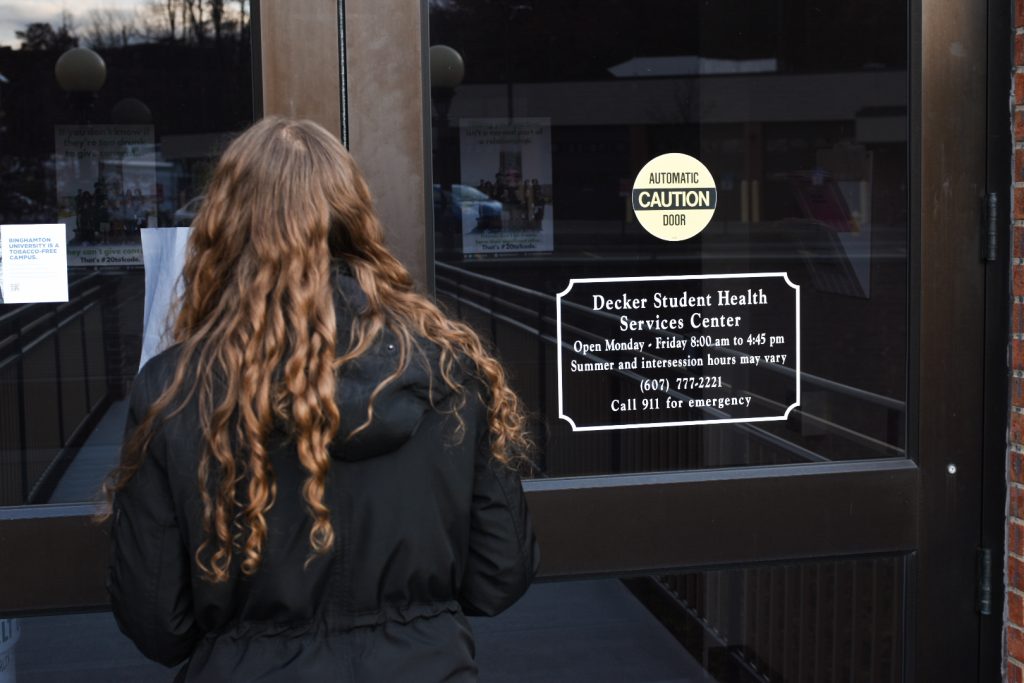
In an effort to encourage more students to get tested for sexually transmitted diseases and infections, the Decker Student Health Services Center is now offering daily HIV tests for students and has extended STI appointments for asymptomatic students, or students who do not show symptoms of an STI.
Under the direction of Richard Moose, medical director of Decker Student Health Services Center, and Peggy Smith, coordinator of clinical services, all nurses and doctors at Decker Student Health Services Center have been trained on how to administer tests for HIV, chlamydia and gonorrhea, allowing the health services center to offer daily STI and STD testing. Until recently, testing has only been offered once per week at Decker Student Health Services Center.
According to Moose, there hasn’t been an increase in HIV or STI cases at Binghamton University. Rather, the change was made to encourage more students to get tested and prevent these diseases from becoming a problem at BU.
“Young adults on university campuses experience high rates of sexually transmitted infections, yet many don’t get tested due to a lack of easy-to-access screening opportunities,” Moose said.
Previously, HIV testing was only offered through nurse visits, and gonorrhea and chlamydia testing only happened during an appointment with a nurse practitioner or physician. Now, all nurses can order gonorrhea, chlamydia and HIV testing.
“When I started working here, I identified this as an area of need for college students between the ages of 15 and 25, which are at a higher risk of contracting a sexually transmitted disease,” Moose said. “The tests are being offered daily, as limiting availability to one morning per week limits the number of students who can come at that time.”
Common symptoms for an STD or STI include painful urination, lower abdominal pain, vaginal discharge in women and discharge from the penis in men, but some infections are asymptomatic.
According to Smith, the HIV test, which is conducted by taking a small amount of blood from a patient, is currently free of charge as it is covered by the student health fee. For chlamydia and gonorrhea, testing can be done through a urine, vaginal, anal or oral swab test. These tests need to be sent to a laboratory off campus, so Decker Student Health Services Center charges a student’s insurance for them.
Increasing availability of HIV testing is in line with a plan by Gov. Andrew Cuomo to make New York the first state in the nation to commit to ending the AIDS epidemic. The initiative, first introduced in 2014, aims to maximize the availability of treatment for HIV and improve the health of New Yorkers. The initiative includes three main priorities to tackle HIV and AIDS, with the first being to identify people with undiagnosed HIV and to get them care. According to Smith, while the state initiative didn’t focus on college campuses, Decker Student Health Services Center’s staff used it as a blueprint for improving STI testing on campus.
“Student appointments for both HIV and STI testing were filled quickly,” Smith said. “STI appointments were typically booked out one week and HIV appointments booked out up to 3 weeks. As the coordinator of clinical services at [Decker Student Health Services Center], I constantly review the health care needs of the student population to see if we can improve delivery. After determining that there was, indeed, a need to make more STI [and] HIV screening appointments available, I looked at utilizing our nursing staff to perform asymptomatic screenings in lieu of a provider.”
According to Maya Lord-Dagostino, a sophomore double-majoring in human development and Africana studies, it is critical that Decker Student Health Services Center also offers other resources, including more staff, to ensure students get assistance with a variety of medical issues.
“While more HIV and STI testing are great, Decker also needs more staff members and longer hours so more students can get whatever medical help they need,” Lord-Dagostino said.
Kelly Keleman, a sophomore majoring in mathematics, said she wants to increase dialogue about STIs on campus, and hopes the expansion of HIV and STI testing will help kick-start the conversation on campus.
“People on campus know about [STIs], but don’t want to talk about it,” Keleman said. “If Decker can reach out to more students and make STIs a more comfortable topic, our campus will be a safer and better place.”
According to Moose, it is essential for students to get tested regularly.
“I would also like the information to get out to the campus that regular testing for STIs is essential,” Moose said. “If someone is in a mutually monogamous relationship, testing once a year is enough. If someone is having more than one sexual partner in a year, then they should be tested more frequently.”
Students can make appointments to get tested in person or through Decker Student Health Services Center’s Patient Portal, which can be accessed through students’ myBinghamton accounts.


